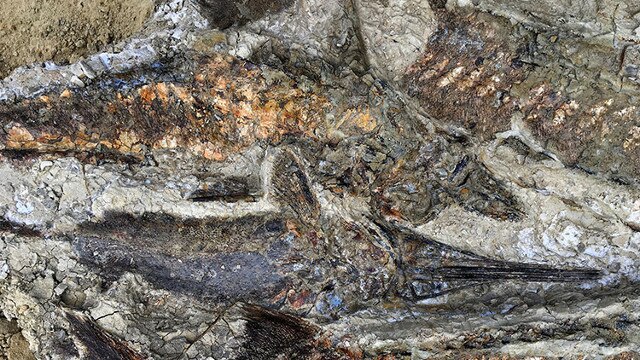Fossil ‘mother lode’ records Earth-shaking asteroid’s impact
The fossilised remains of a mass of creatures that died minutes after a huge asteroid hit 66 million years ago have been found.

Scientists in the US say they have discovered the fossilised remains of a mass of creatures that died minutes after a huge asteroid slammed into the Earth 66 million years ago, sealing the fate of the dinosaurs.
In a paper to be published today, a team of paleontologists headquartered at the University of Kansas say they found a “mother lode of exquisitely preserved animal and fish fossils” in what is now North Dakota. The paper is to be published in the Proceedings of the Academy of Natural Sciences.
The asteroid’s impact in what is now Mexico was the most cataclysmic event ever known to befall Earth, eradicating 75 per cent of the planet’s animal and plant species, extinguishing the dinosaurs and paving the way for the rise of humans.
Researchers believe the impact set off fast-moving, seismic surges that triggered a sudden, massive torrent of water and debris from an arm of an inland sea known as the Western Interior Seaway.
At the Tanis site in North Dakota’s Hell Creek Formation, the surge left “a tangled mass of freshwater fish, terrestrial vertebrates, trees, branches, logs, marine ammonites and other marine creatures”, according to Robert DePalma, the report’s lead author.
Some of the fish fossils were found to have inhaled “ejecta” associated with the Chicxulub event, suggesting seismic surges reached North Dakota within “tens of minutes”, he said.
“The sedimentation happened so quickly everything is preserved in three dimensions — they’re not crushed,” said co-author David Burnham.
“It’s like an avalanche that collapses almost like a liquid, then sets like concrete. They were killed pretty suddenly because of the violence of that water. We have one fish that hit a tree and was broken in half.”
The fossils at Tanis include what were believed to be several newly identified fish species, and others that were “the best examples of their kind”, said Mr DePalma, a graduate student and curator of the Palm Beach Museum of Natural History in Florida. “We look at moment-by-moment records of one of the most notable impact events in Earth’s history. No other site has a record quite like that.
“And this particular event is tied directly to all of us — to every mammal on Earth, in fact. Because this is essentially where we inherited the planet. Nothing was the same after that impact. It became a planet of mammals rather than a planet of dinosaurs.”
AFP



To join the conversation, please log in. Don't have an account? Register
Join the conversation, you are commenting as Logout